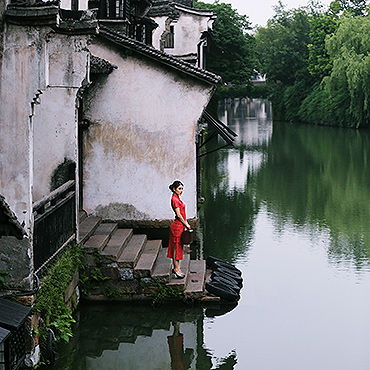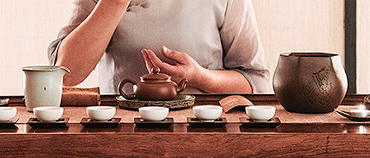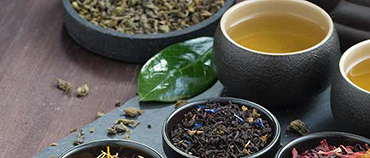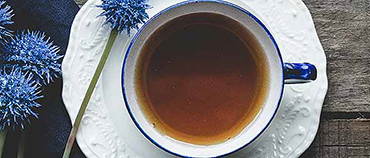
There is something utterly calming and restorative that arises from the simple act of pouring boiled water onto crisp, tight tea leaves. The sound of water plunging to the bottom of a pot.
The slow spread of color as flavor seeps through water. The promise of peace, relief, and calm – if only for a few moments.
It’s any wonder then that tea has infused the very lifeblood of Chinese people. You simply cannot walk down a bustling Beijing thoroughfare or a high street in Shanghai without seeing locals hurrying by, the ubiquitous tea flask with a fresh brew clasped in hand.
Even a western traveler with no knowledge of Chinese tea will know that tea is an integral part of life for Chinese people. No doubt you’ve heard the saying “I wouldn’t do it for all the tea in China”, but never really understood what it meant. So let’s clear that up with a little tea back story in this blog.
Why choose Chinese tea?
The fact is tea is part of the fabric of being Chinese. You’ll discover as much when you explore China on tour. In fact, you’ll be hard pressed to make your way around this vast country without some exposure to this elixir of life in which the locals place so much faith.
Like many things in China, the origins of Chinese tea reach back thousands of years and are steeped in popular legend. While there are references to Chinese tea in literature dated at 5,000 years, there is one story that beautifully captures the transformative nature of tea.
It is widely believed Emperor Shen Nung (Shennong) fortuitously happened upon tea when a camellia was blown into his cup of boiled water around 2737BC. He rather fancied the flavor that resulted from this convenient twist of fate and declared the brew to be a winner. Whether there is truth in the legend we’ll never know, however, more serious – and perhaps legitimate references to tea – were found around 1046 BC in Erh Ya, China’s first dictionary.

Consumed originally for its medicinal benefits, over time, Chinese tea – its production, preparation, and consumption – has evolved into a form of art. Incredibly, traditions established thousands of years ago endure today.
The classic art of Chinese tea
It’s said the art of drinking tea was popularized through the work of a (perhaps not so humble) Buddhist priest, Lu Yu. It was Lu who penned The Classic Art of Tea, in which he provided careful notes about exactly how to brew, steep, and serve this most noble of beverages. He claimed that nothing short of water from a slow-moving stream and tea leaves placed delicately in porcelain cups was acceptable. And the ideal spot for savoring the brew? Well, naturally that was sitting under a pavilion looking out over a water lily covered pond with a fair maiden. It seems that despite his poetic tendencies, Lu was a practical man too. He is attributed with tea production techniques that are still used today. Nobody can say he wasn’t committed to his art.
Like boiled water drawing out the flavor of your favorite jasmine tea, the culture of tea gradually seeped into every aspect of Chinese life. Now there can be no China without tea. In fact, some Chinese tea (white, yellow and the post-fermentation process of Pu’er tea) is ‘collected’ in the same way a westerner collects wines.
“Three years is medicine. Seven years a treasure”
Fascinated? We are too. Read on to learn a little more of the surprising and interesting facts behind this life-giving beverage.
Types of Chinese Tea
In Chinese tea parlance, there isn’t just one tea; there are many. In very simple terms, this means, there is no one-size-fits-all. No, when it comes to Chinese tea, there are classifications. Simply put, these classifications reflect the amount of fermentation which occurs when the tea is processed. This results in a scale of tea strength and color once the tea is brewed.
Here’s what that looks like.

Visually, it’s easy to distinguish between the different types of tea, however a little more detail may help with understanding your tea purchases on tour.
What’s the difference between the types of tea?
Tea connoisseurs will argue about the distinctions between the types of tea, but that’s not our purpose here. We want you to feel confident you can ‘talk tea’ when you cross the threshold of any tea shop in China. So for the purposes of education we’ve explained the basics of each main type of tea.
Green tea

You’ve possibly been living under a rock if you haven’t heard about the health-giving benefits of green tea. Officially evaluated by the World Health Organisation as the only healthy beverage for inclusion in a healthy diet, green tea certainly has its fans. It’s been heralded as a salvation for a whole host of ailments: detoxing, eyesight improvement, oral health, cancer prevention, improving heart health, weight loss, protection against ionizing radiation, and more.
Traditionally, green tea is picked and processed in the spring and it’s said, the fresher the better for drinking – and the more you’ll pay for your tea. While every part of China claims to grow the best tea, Longjing or Dragon Well tea grown around Hangzhou, is the most expensive – and arguably the best green tea in China.
Ardent Chinese tea drinkers will favor green tea in the spring and summer, but if you’re like us at ChinaTours.com, you’ll drink it any time you like.
White tea

White tea has a similar composition to green tea and is highly regarded for its health-giving attributes too. Because it is rich in flavonoids, white tea is antibacterial, and has an antioxidant and anti-radiation effect, and it’s these very properties which have seen white tea and its extracts included in skin care products.
Even if you feel white tea’s anti-ageing effects are difficult to swallow, you can drink this wonderful beverage all year round, knowing it’s good for your health.
Yellow tea

Yellow tea is yet another Chinese tea revered for its health benefits. Looking for a digestive aid? Yellow tea may help. In Chinese medicine, yellow tea is considered helpful for indigestion, loss of appetite, or excess weight. Science has shown yellow tea is rich in nutritional ingredients, such as tea polyphenols, amino acids, soluble sugars, and vitamins. It’s even considered helpful in the prevention and treatment of esophageal cancer.
Yellow tea is considered similar to green tea, but more mellow in flavor. This may be due to the fact it is fermented prior to being dried. It may also be due to similarities in production, which like green tea, involves a ‘wok fry’ process, albeit for less time and at a lower heat. The ‘yellow’ comes from ‘trapping’ moisture inside the tea, which leads to oxidation and fermentation.
Oolong tea

The mention of Oolong tea conjures up the quintessential Chinese tea experience. With many styles and flavors of oolong (or wulong) tea available, among the most famous are those grown in the Wuyi Mountains. It is here you will find the home of production for specialty teas like Da Hong Pao. Given tea produced in Wuyi Mountains is said to have cured the mother of a Ming dynasty emperor, it’s hardly a surprise to learn that oolong tea from this region commands the same price as a collectible bottle of wine.
Oolong tea is rich in ‘methylated catechins’, giving it anti-allergic, anti-inflammatory, and antioxidant functions. It’s also believed to have properties that protect liver cells, lower blood pressure, and produce the best weight loss effect of all Chinese tea varieties.
Black tea

Black tea is actually called ‘red’ tea in China due to the color of leaves once they oxidize. Like all other Chinese tea, black tea reputedly has many health benefits. A potion for warming the stomach and those with a poor constitution, black tea has also been shown to lower cholesterol. Among the other benefits of this beverage is how well it holds its flavor; up to several years in fact. This longevity made it a kind of currency used for trade between Mongolia, Tibet and Siberia well into the 19th century.
Want to introduce a little black tea into your repertoire? Buy yourself a brick and try drinking it in autumn and winter for best benefits.
Dark tea

You might be thinking, first black tea and now dark tea. Aren’t they the same thing?
Not at all. Dark tea – or ‘hei cha’ – is defined as any tea which is passed through a second fermentation process. Let’s explain. All tea will go through a process wherein it is withered, dried and shaped. The tea is fired to kill off any enzymes in the plant to prevent breakdown of the leaf.
On the other hand, dark tea is put through a second post-production fermentation process. As a consequence, the microorganism which emerges through this process makes the tea a probiotic. The tea is ‘aged’ and over time – months or even years – the chemistry of the tea changes.
There’s even more good news about dark tea. It can be consumed all day (as the Chinese do) and it offers health benefits like fat reduction, lowered blood sugar levels, and immunity support. And it’s a tea that keeps on giving. Dark tea can be re-steeped many times.
The wrap up on Chinese tea
We know this won’t answer all your questions about Chinese tea, but it may help you to understand a few of the nuances around different types of tea. You can read more about Chinese tea, including how to choose a Chinese tea, where to buy the very best Chinese teas, tea ceremonies, and all tea-related matters in our Travel Guide.
ChinaTours.com is dedicated to helping western travelers from the United States, United Kingdom, Australia, Canada, and elsewhere enjoy a genuine experience of China. That means we’re always searching for ways to clear up the confusion around vital aspects of Chinese culture to make your tour exactly what it should be – the content of beautiful travel memories. If you’d like to know more about the very best Chinese tea, or even take a totally tea-focused tour of China, just let us know. We are tea connoisseurs ourselves and would love to share our passion with you. Enquire via our contact form and we’ll respond within 24 hours.




 Thanks China Tours
Thanks China Tours








